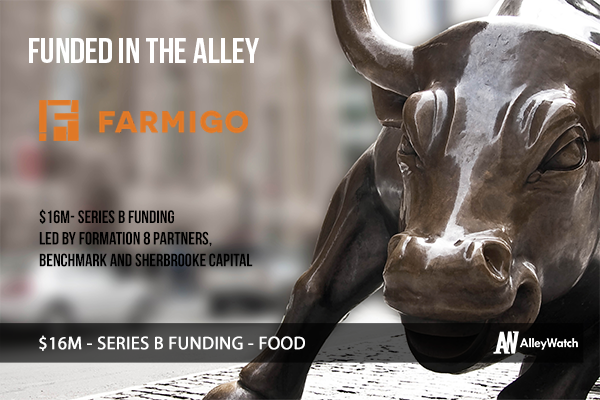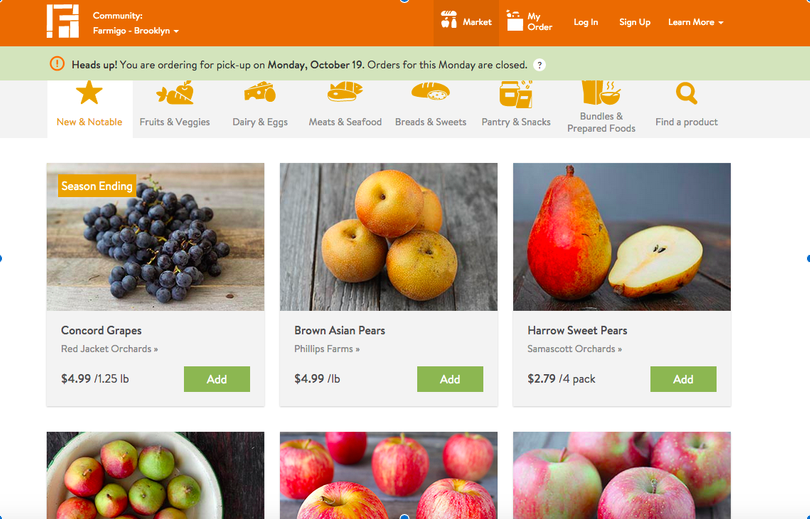We live in a much different world than our grandparents in nearly every respect; transportation, communication and most importantly in terms of food. The pristine farm, once holding the biggest role, is now thrown behind everything else, where no one thinks twice about where there food comes from. But one company is trying to help connect us with our food again! Farmigo, the company that is providing fresh farm foods to local neighborhoods is doing us all a service by supporting our local farmers we are all so indebted to.
On the heels of their recent funding, CEO Benzi Ronen joins AlleyWatch to explain Farmigo from the roots up and how they plan on expanding further.
Who were your investors and how much did you raise?
Farmigo raised $16 million in Series B funding. The financing was led by new investor Formation 8 Partners and includes participation from existing investors Benchmark and Sherbrooke Capital. Farmigo has raised a total of $26 million in funding.
Tell us about your product or service.
We’re an online farmers’ market that brings incredibly fresh food from the best local providers to convenient pick-up sites where people already convene such as a school, a small business, a workplace or a personal home.
What inspired you to start the company?
The current food industry status quo is what compelled me to start Farmigo in 2009. I felt that the solutions to reinvent our food system were falling short and I was concerned about farmers losing their central role in our food production. I saw Big Supermarket becoming the key protagonist of a food ecosystem that uses many middlemen and pushes our farmers to yield more at a cheaper price, in a way that is unsustainable long term. We also no longer know where our food is coming from and how it’s being produced. Sourcing is incredibly opaque as Big Supermarket works with a long and nebulous sourcing and distribution chain, where mass-produced food travels an average of 10 days before it gets to our plate.

After spending two decades in the technology sector, I saw the opportunity to use technology to put farmers back at the center of our ecosystem and help people reconnect with the way their food is produced. We must empower and champion our local farmers, producers and artisans who are the backbone of a better food ecosystem. This is only by advocating for a varied, independent, seasonal and local food ecosystem, that we will find our way back to food the way it is meant to be made and meant to taste. FARMIGO, is literally a contraction of FARM and AMIGO, ‘farmers friend’, because I believe that knowing about our local farmers and supporting them is how we can have a lasting impact on changing the food we consume and how we consume it.
Farmigo gives full transparency by making a direct connection between consumers and farms. We use a technology platform to source food from the best farms and collapse the food distribution chain to create a transparent food ecosystem that is better for the consumer, better for the farmer and better for the planet. We eliminate the guesswork for consumers so that they can trust again where their food is coming from.
How is it different?
We’re connecting people directly to great local food, using a technology platform that allows us to collapse the long distribution chain of supermarkets, and harvest or make food only after it’s ordered, which ensures the best and freshest food. This just-in-time model eliminates storage and reduces waste and spoilage. This enables us to pay our farmers and food producers 60 cents to the dollar compared to industry standards, which can be as low as 20 cents to the dollar.
We also have a unique community-based distribution model. We’ve replaced the last-mile infrastructure of food delivery by creating a drop-off system of up to 20 orders in neighborhood sites where communities already convene, such as a school, a workplace or a neighbor’s home. This drastically cuts delivery costs.
What market are you targeting and how big is it?
We’re targeting the food industry that has been valued at about $600 billion. Today less than 1% of food and beverage sales occur online. This is a category ripe for disruption.
What’s your business model?
We are changing the food ecosystem by using a very efficient technology-led just-in-time model to collapse the food distribution chain, connecting consumers directly to the growers and producers of their food. We only harvest or produce what our users order.
Our business model is specifically designed to avoid the massive costs associated with home delivery. The industry is realizing that home delivery is particularly costly and much harder than people expected. Our business model of having an organizer in a neighborhood serve as a community pick-up location is an extraordinary advantage in the category. Our model allows us to avoid the huge costs associated with home delivery and can scale across regions in a way that is affordable for the consumer and economical from a business perspective. It also embeds us firmly into local communities.
What was the funding process like?
We’ve been lucky to connect with great partners such as Benchmark, Sherbrooke and Formation 8 Partners. Our latest investor, Formation 8 Partners, has deep expertise in the food category and immediately understood the challenges but also the tremendous opportunities at hand for Farmigo. Our existing investors who have been with us since our Series A round, Benchmark and Sherbrooke Capital, also participated in the Series B round. They have extensive knowledge of our company and their participation was an additional testament to their belief that we are on the right path.
What are the biggest challenges that you faced while raising capital?
The biggest challenge for us and for the online food industry is to be able to demonstrate the scalability of the business. Today, we are present in four markets – New York, New Jersey, San Francisco/Bay Area and most recently Seattle/Tacoma. Each of our expansions into new markets has been carefully planned. Our latest launch in Seattle/Tacoma has shown our investors that our business model based on community-driven distribution, where we deliver food to central pick-up sites, allows us to scale in a sustainable way.
What factors about your business led your investors to write the check?
The maturity of the food category was a key factor. We still buy food the way we did 100 years ago. This is a category that is ready to be reinvented.
Another key factor was of course the viability of our business, our current growth rate and our unique business model that uses a very efficient technology platform to reconnect people to their food and to their communities. The fact that we don’t have a costly door-to-door model is very appealing to our investors, as it gives us a true competitive advantage.
What are the milestones you plan to achieve in the next six months?
We plan on establishing strong roots in the Seattle/Tacoma region and on continuing to see growth in all of our four markets. Our business has more than doubled in early 2015. To date, sales are five times higher than last year and are expected to triple again in the next six months. Farmigo is currently feeding more than 15,000 families each month in more than 350 neighborhoods and working with more than 150 producers.
What advice can you offer companies in New York that do not have a fresh injection of capital in the bank?
My advice would be: focus on solidifying your business model. Don’t be afraid of making big changes if you realize it’s not working out. Nothing should be sacred at this stage of the company, other than your integrity and commitment to delivering the best product to your target audience. Once you can prove your business model is ironclad, the right investors will come.
Where do you see the company going now over the near term?
I expect that the company will continue to grow and launch into a new market in the near term. To date, we’re the online farmers’ market with the largest footprint in the U.S. In the long term, we’re aiming to become a national company.
Where is your favorite place to enjoy the fall weather in the area?
Our new office is situated right between the Gowanus and Carroll Gardens neighborhoods in Brooklyn – it’s a great location to enjoy all that New York has to offer in the Fall. The neighborhood’s boasts some of the best restaurants in Brooklyn and the revitalized Gowanus canal is incredibly peaceful this time of the year.





